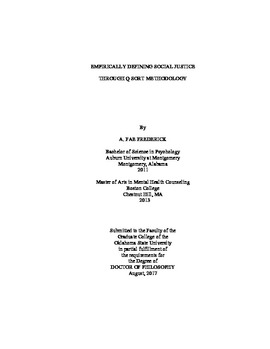| dc.contributor.advisor | Crethar, Hugh C. | |
| dc.contributor.author | Frederick, A. Fae | |
| dc.date.accessioned | 2018-04-23T18:13:15Z | |
| dc.date.available | 2018-04-23T18:13:15Z | |
| dc.date.issued | 2017-08 | |
| dc.identifier.uri | https://hdl.handle.net/11244/299503 | |
| dc.description.abstract | Social justice, as a term, has existed since the mid-1800s. Although the idea of creating more opportunities for disadvantaged social groups has existed much longer. Social justice has been called the "fifth force" in counseling psychology and plays an increasingly prominent role in professional organizations of the field. Hundreds of articles and books espouse the importance of social justice and define how practitioners may begin to work towards a more socially just world. This information is imperative for those who desire to advocate for their clients beyond the therapy room. However, in the excitement that poured forth at the chance to foster more systemic change, the definition of social justice was left to speculation rather than operationally defined. This study adds an empirical grounding to the term social justice through a Q sort (a mixed methods ranking tool) distributed to experts and scholars in social justice across psychology, social work, public health and theology (N=19). Participants were diverse in location, vocation, and demographics. Two factors emerged demonstrating different schools of thought on the definition of social justice. Participants in both factors valued action to reduce marginalization/oppression, however, participants in Factor A ranked items around equitable resources and access higher, whereas those in Factor B ranked items relating to using data to show the need for and aid in change as more important. Themes ranked to be most like the definition of social justice included: action to decrease marginalization/oppression now and in the future, access to resources and rights, and equitable distribution. Themes ranked to be least like the definition of social justice included: using top down power to bring change, religious motivation, and obligation. By co-creating this definition with prominent scholars in the area, social justice can gain the credibility it needs to continue as a driving force in the field of counseling psychology and beyond. Implications for research and practice, limitations, and future research possibilities are discussed. | |
| dc.format | application/pdf | |
| dc.format | image/jpeg | |
| dc.language | en_US | |
| dc.rights | Copyright is held by the author who has granted the Oklahoma State University Library the non-exclusive right to share this material in its institutional repository. Contact Digital Library Services at lib-dls@okstate.edu or 405-744-9161 for the permission policy on the use, reproduction or distribution of this material. | |
| dc.title | Empirically defining social justice through Q sort methodology | |
| dc.contributor.committeeMember | Romans, John | |
| dc.contributor.committeeMember | Hammer, Tonya R. | |
| dc.contributor.committeeMember | Croff, Julie | |
| dc.contributor.committeeMember | Mwavita, Mwarumba | |
| osu.filename | Frederick_okstate_0664D_15253.pdf | |
| osu.accesstype | Open Access | |
| dc.type.genre | Dissertation | |
| dc.type.material | Text | |
| thesis.degree.discipline | Educational Psychology | |
| thesis.degree.grantor | Oklahoma State University | |


